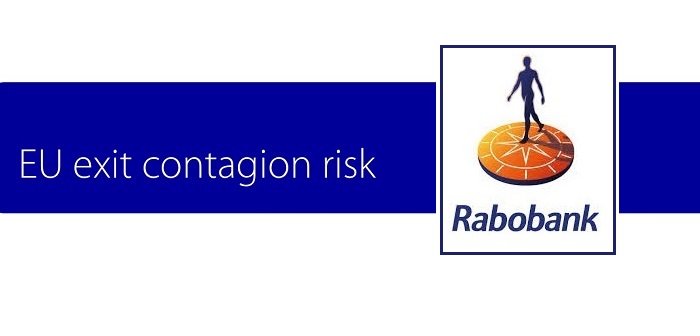A new Brexit report by the Dutch-based Rabobank has identified Austria, France, Greece, Italy and the Netherlands as the most likely contenders to follow the UK in deciding to leave the EU.
The report, written by Elwin de Groot, head of Macro Strategy at Rabobank Financial Markets Research, also suggests that the UK’s Brexit decision has “rekindled” the so-called Eurosceptic debate in other countries.
“Brexit has fuelled concerns that more EU countries will follow the British example,” writes Mr de Groot, although he then makes the point that the UK was, and always has been, the odd-one-out in the EU.
“The UK is not one of the founders of the EU, does not use the Euro and is not a member of the Schengen zone. The UK also frequently negotiated exemptions in EU laws. As such, EU sentiment in the UK was way more negative, and consistently so, than in other big EU countries.”
In looking at who might follow the UK’s example, however, he ranks the exit risk in his five listed countries as follows:
- Austria – The Freedom Party of Austria, which is leading the polls for the country’s 2018 election, has a critical stance vis-à-vis the EU and favours a common currency for the Northern EU countries. So far the party has not asked for a referendum, although it has threatened to do so if Turkey joins the EU or more responsibilities are moved towards Brussels. Currently, however, polls show support for the Austrian EU membership at this moment.
- France – The big question is whether or not National Front leader Marine le Pen will win the presidential elections next spring. She has already pledged to hold a referendum about the French EU membership if she is elected. However, an opponent from the Republican Party (probably Juppé or Sarkozy) would beat Le Pen according to recent polls.
- Greece – Debt crisis made Greeks the most negative people about the EU and the next Greek elections are scheduled in 2019. A referendum on the membership of the EU or on the Euro is, however, not on the agenda at the moment.
- Italy – The country will vote on constitutional reform on December 4, with Prime Minister Renzi possibly resigning if his proposals are rejected. Whilst this could simply lead to his replacement or the installation of a temporary technocratic government, it could also put the country on a path to new elections when the left-wing Five Star Movement would have a good chance of winning. Although this party is clearly Eurosceptic, but is not necessarily in favour of leaving the Eurozone.
- The Netherlands – The Freedom Party, which leads the polls for the 2017 elections, party wants to hold a referendum on an EU exit. While Dutch citizens are ambiguous in their support of holding a referendum, current polls show support for the Netherlands to stay in the EU.


